Join Us for a Free “State Tax Policy Boot Camp”
The Tax Foundation’s “State Tax Policy Boot Camp,” is ideal for anyone interested in gaining a better understanding of state taxation.
2 min read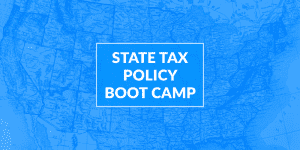
The Tax Foundation’s “State Tax Policy Boot Camp,” is ideal for anyone interested in gaining a better understanding of state taxation.
2 min read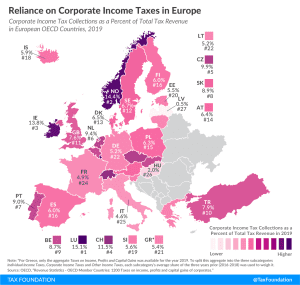
Despite declining corporate income tax rates over the last 30 years in Europe (and other parts of the world), average revenue from corporate income taxes as a share of total tax revenue has not changed significantly compared to 1990.
1 min read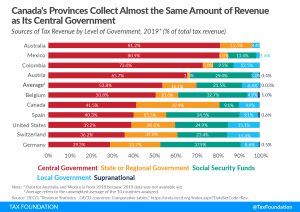
Developed countries have on average become more reliant on consumption taxes and less reliant on individual income taxes. These policy changes matter, considering that consumption-based taxes raise revenue with less distortionary effects than taxes on income.
16 min read
As the House Ways and Means Committee continues working on the latest round of fiscal relief amid the pandemic, one curious provision in the legislation is a tax hike on multinational companies. One section of the legislation would repeal a provision in current law that allows U.S. multinationals to choose to allocate their interest costs on a worldwide basis (more on that in a moment).
4 min read
The House Ways and Means Committee measures would further extend the relief measures created by the CARES Act and the Consolidated Appropriations Act of 2021, and would go further by significantly expanding existing tax credits and making changes to the international tax system.
7 min read
In addition to its economic impact on Maryland businesses and the likelihood of serious legal challenges, Maryland’s proposed digital advertising tax is incredibly vague on vital definitions, creating uncertainty about where revenue is sourced and when it is subject to the tax.
17 min read
The potential override of Gov. Larry Hogan’s (R) veto of a digital advertising tax (HB732) looms large over the current legislative session in Maryland, though it is only one of many tax proposals under consideration in the state.
7 min read
Depending on your perspective, tariffs are either a great way to tax countries like China for their protectionist trade policies or they are a big reason why all those imported toys, clothing and holiday gifts cost more than you expected. You’ll learn what tariffs are, how they function, and how they can impact the domestic U.S. economy.

Improving trust fund solvency and staving off costly business tax increases is a win-win proposition for federal and state governments alike.
4 min read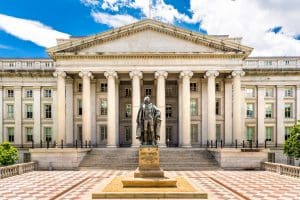
This week, the Treasury Department added several new appointees as staffing continues following President Biden’s inauguration. Among them were three scholars of international tax policy: economist Kimberly Clausing and law professors Rebecca Kysar and Itai Grinberg. These three will be influential in developing the administration’s approach to changing U.S. tax rules for multinational corporations and negotiating international tax policy changes at the Organisation for Economic Co-operation and Development (OECD).
4 min read
The consultation on the EU’s digital levy provides an opportunity for policymakers and taxpayers to reflect on the underlying issues of digital taxation and potential consequences from a digital levy. Unless the EU digital levy is designed with an OECD agreement in mind, it is likely to cause more uncertainty in cross-border tax policy.
12 min read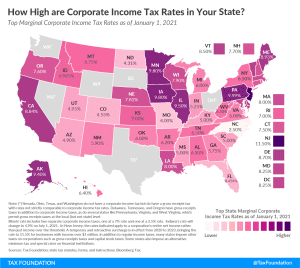
North Carolina’s 2.5 percent corporate tax rate is the lowest in the country, followed by Missouri (4 percent) and North Dakota (4.31 percent). Seven other states impose top rates at or below 5 percent: Florida (4.458 percent), Colorado (4.55 percent), Arizona (4.9 percent), Utah (4.95 percent), and Kentucky, Mississippi, and South Carolina (5 percent).
7 min read
We identify 13 of the highest tax reform priorities Nebraska policymakers should consider in their effort to create a more growth-friendly tax code. We also offer a sample comprehensive tax reform plan to show one way policymakers could begin tackling these objectives over the next couple legislative sessions, with further progress to be made in the years ahead.
8 min read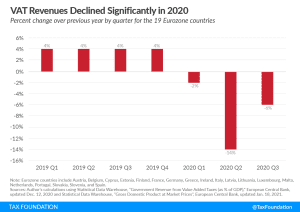
Many governments have chosen to use VAT as a tool to provide tax relief for consumption in various sectors throughout the pandemic, but in the long term, VAT should not be used as a tool for relief.
3 min read
Unless the legislature acts, businesses that have received PPP loans and related federal assistance will face $457 million in state taxes through 2024—with more than half of those taxes coming due this spring—despite Wisconsin being on track to see continued general fund revenue growth even amid the pandemic.
4 min read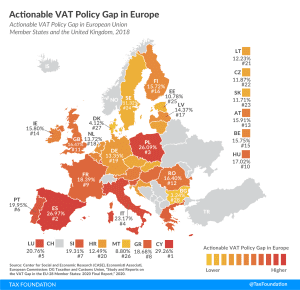
Value-added taxes (VAT) make up approximately one-fifth of total tax revenues in Europe. However, European countries differ significantly in how efficiently they raise VAT revenues. One way to measure a country’s VAT efficiency is the VAT Gap.
4 min readJoe Biden has proposed an ambitious agenda that would make the federal fiscal system more progressive, and the huge budget deficits caused by the numerous COVID-19 relief packages could heighten the call for more tax revenues. What is needed are benchmark facts to guide these debates.
13 min read
Despite the potential of consumption taxes as a neutral and efficient source of tax revenues, many governments have implemented policies that are unduly complex and have poorly designed tax bases that exclude many goods or services from taxation, or tax them at reduced rates.
40 min read
The economy and climate change are two challenges the Biden administration has identified as priorities. One way to address both issues at the same time is to enact a carbon tax to discourage carbon emissions, and to use the resulting carbon tax revenue to lower—or in the case of the TCJA’s individual provisions, avoid increases of—other, more distortive, types of taxes. This would not only address the challenges of climate change but also support the economy.
3 min read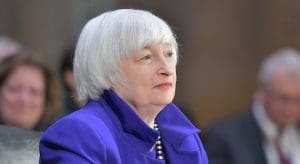
In her recent confirmation hearing, economist Janet Yellen, President Biden’s choice for Treasury Secretary, sought to reassure markets that the new administration would not raise corporate taxes until the economy improves. At the same time, however, she sent a troubling signal that when they do push for higher corporate tax rates, they would do so in coordination with other countries so that the U.S. doesn’t lose its competitive edge.
5 min read